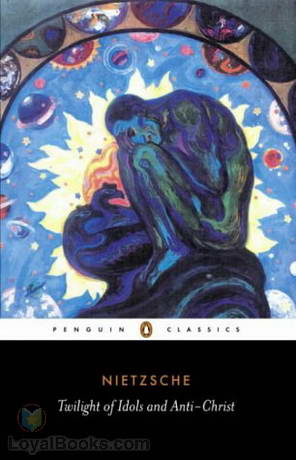|
Books Should Be Free Loyal Books Free Public Domain Audiobooks & eBook Downloads |
|
|
Books Should Be Free Loyal Books Free Public Domain Audiobooks & eBook Downloads |
|
The Twilight of the Idols or How to Philosophise with the Hammer |
|---|

In "The Twilight of the Idols or How to Philosophise with the Hammer," Nietzsche presents a provocative and challenging critique of Western philosophy, morality, and culture. Through a series of aphorisms and essays, Nietzsche confronts the prevailing values of his time, arguing that traditional beliefs and ideals have become hollow and life-denying.
Nietzsche's writing is bold and uncompromising, challenging readers to question their most deeply held convictions and beliefs. He condemns the herd mentality he sees pervading society, urging individuals to think for themselves and create their own values. His concept of the "will to power" is particularly striking, suggesting that humans are driven by a primal desire for dominance and self-assertion.
While Nietzsche's ideas are undoubtedly controversial and sometimes difficult to digest, his sharp wit and incisive prose make for an engaging and thought-provoking read. "The Twilight of the Idols" is a call to arms for those seeking to break free from the constraints of conventional wisdom and forge their own path through life. Book Description: Of The Twilight of the Idols, Nietzsche says in Ecce Homo: “If anyone should desire to obtain a rapid sketch of how everything before my time was standing on its head, he should begin reading me in this book. That which is called ‘Idols’ on the title-page is simply the old truth that has been believed in hitherto. In plain English, The Twilight of the Idols means that the old truth is on its last legs.” Certain it is that, for a rapid survey of the whole of Nietzsche’s doctrine, no book, save perhaps the section entitled “Of Old and New Tables” in Thus Spake Zarathustra, could be of more real value than The Twilight of the Idols. Here Nietzsche is quite at his best. He is ripe for the marvellous feat of the transvaluation of all values. Nowhere is his language – that marvellous weapon which in his hand became at once so supple and so murderous – more forcible and more condensed. Nowhere are his thoughts more profound. But all this does not by any means imply that this book is the easiest of Nietzsche’s works. On the contrary, I very much fear that unless the reader is well prepared, not only in Nietzscheism, but also in the habit of grappling with uncommon and elusive problems, a good deal of the contents of this work will tend rather to confuse than to enlighten him in regard to what Nietzsche actually wishes to make clear in these pages. (Excerpt from A. Ludovici’s Preface) |
| Genres for this book |
|---|
| Non-fiction |
| Philosophy |
| Links related to this book |
|---|
| Wikipedia – Friedrich Nietzsche |
| Wikipedia – The Twilight of the Idols |
| Reviews (Rated: 5 Stars - 1 review) |
|---|
|
Reviewer: TheBull - June 24, 2016 Subject: Walter Kaufman Look, I'm just saying from experience, that the translator of Freddy Neitzche makes all the diffference. Unless you have a Walter Kaufman translation - for reasons too many to list here - it is often difficult if not impossible to understand him. FN is difficult under any circumstances, but I had a Penguin translation a long time ago, can't remember now which Neitzche book it was, and I had to abandon it and go back to Kaufman. Just saying. |